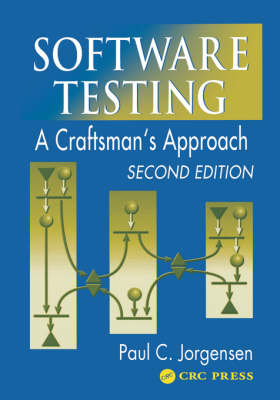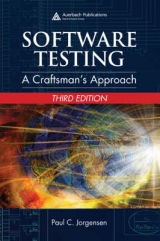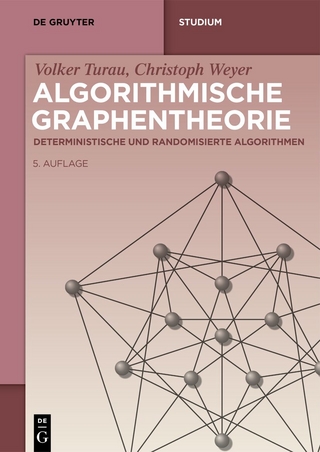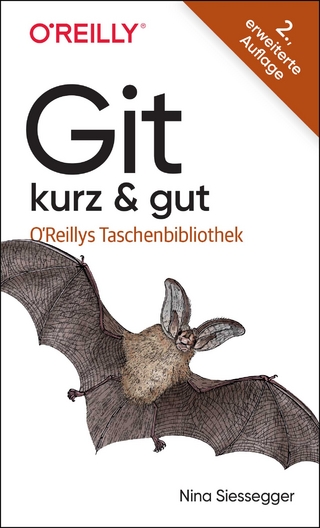
Software Testing
Crc Press Inc (Verlag)
978-0-8493-0809-3 (ISBN)
- Titel erscheint in neuer Auflage
- Artikel merken
The software development world has changed significantly in the past five years. Noteworthy among its many changes is the emergence of the "Unified Modeling Language" (UML) as an industry standard. While thousands of software computer professionals and students continue to rely upon the bestselling first edition of Software Testing, the time has come to bring it up to date.
Thoroughly revised, the second edition of Software Testing: A Craftsman's Approach reflects the recent growth and changes in software standards and development. Outdated material has been deleted and new topics, figures, case studies now complement its solid, accessible treatment of the mathematics and techniques of software testing. Foremost among this edition's refinements is the definition of a generalized pseudocode that replaces the outdated Pascal code used in the examples. The text is now independent of any particular programming language. The author has also added five chapters on object-oriented testing, incorporated object-oriented versions of two earlier examples, and used them in the chapter on object-oriented testing, which he completely revised with regard to UML. In addition, GUI testing receives full treatment.
The new edition of Software Testing provides a comprehensive synthesis of the fundamentals, approaches, and methods that form the basis of the craft. Mastering its contents will allow practitioners to make well-informed choices, develop creative solutions, and ultimately derive the sense of pride and pleasure that a true craftsperson realizes from a job well done.
A MATHEMATICAL CONTEXT
A PERSPECTIVE ON TESTING
Basic Definitions
Test Cases
Insights from a Venn Diagram
Identifying Test Cases
Error and Fault Taxonomies
Levels of Testing
EXAMPLES
Generalized Pseudocode
The Triangle Problem
The NextDate Function
The Commission Problem
The SATM System
The Currency Converter
Saturn Windshield Wiper Controller
DISCRETE MATH FOR TESTERS
Set Theory
Functions
Relations
Propositional Logic
Probability Theory
GRAPH THEORY FOR TESTERS
Graphs
Directed Graphs
Graphs for Testing
FUNCTIONAL TESTING
BOUNDARY VALUE TESTING
Boundary Value Analysis
Robustness Testing
Worst-Case Testing
Special Value Testing
Examples
Random Testing
Guidelines for Boundary Value Testing
EQUIVALENCE CLASS TESTING
Equivalence Classes
Equivalence Class Test Cases for the Triangle Problem
Equivalence Class Test Cases for the NextDate Function
Equivalence Class Test Cases for the Commission Problem
Guidelines and Observations
DECISION TABLE-BASED TESTING
Decision Tables
Text Cases for the Triangle Problem
Text Cases for the NextDate Problem
Text Cases for the Commission Problem
Guidelines and Observations
RETROSPECTIVE ON FUNCTIONAL TESTING
Testing Effort
Testing Efficiency
Testing Effectiveness
Guidelines
Case Study
STRUCTURAL TESTING
PATH TESTING
DD-Paths
Test Coverage Metrics
Basis Path Testing
Guidelines and Observations
DATA FLOW TESTING
Define/Use Testing
Slice-Based Testing
Guidelines and Observations
RETROSPECTIVE ON STRUCTURAL TESTING
Gaps and Redundancies
Metrics for Method Evaluation
Case Study Revisited
INTEGRATION AND SYSTEM TESTING
LEVELS OF TESTING
Traditional View of Testing Levels
Alternative Life Cycle Models
The SATM System
Separating Integration and System Testing
INTEGRATION TESTING
A Closer Look at the SATM System
Decomposition-Based Integration
Call Graph-Based Integration
Path-Based Integration
Case Study
SYSTEM TESTING
Threads
Basis Concepts for Requirements Specification
Finding Threads
Structural Strategies for Thread Testing
Functional Strategies for Thread Testing
SATM Test Threads
System Testing Guides
INTERACTION TESTING
Context of Interaction
A Taxonomy of Interactions
Interaction, Composition, and Determinism
Client-Server Testing
OBJECT-ORIENTED TESTING
ISSUES IN OBJECT-ORIENTED TESTING
Units for Object-Oriented Testing
Implications of Composition and Encapsulation
Implications of Inheritance
Implications of Polymorphism
Levels of Object-Oriented Testing
GUI Testing
Data Flow Testing for Object-Oriented Software
Examples for Part V
CLASS TESTING
Methods as Units
Classes as Units
OBJECT-ORIENTED INTEGRATION TESTING
UML Support for Integration Testing
MM-Paths for Object-Oriented Software
A Framework for Object-Oriented Data Flow Integration Testing
GUI TESTING
The Currency Conversion Program
Unit Testing for the Currency Conversion Program
Integration Testing for the Currency Conversion Program
System Testing for the Currency Conversion Program
OBJECT-ORIENTED SYSTEM TESTING
Currency Converter UML Description
UML-Based System Testing
StateChart-Based System Testing
INDEX
Most chapters include exercises and references
| Erscheint lt. Verlag | 26.6.2002 |
|---|---|
| Zusatzinfo | 65 equations; 123 Tables, black and white; 157 Illustrations, black and white |
| Verlagsort | Bosa Roca |
| Sprache | englisch |
| Maße | 178 x 254 mm |
| Gewicht | 816 g |
| Themenwelt | Mathematik / Informatik ► Informatik ► Software Entwicklung |
| ISBN-10 | 0-8493-0809-7 / 0849308097 |
| ISBN-13 | 978-0-8493-0809-3 / 9780849308093 |
| Zustand | Neuware |
| Informationen gemäß Produktsicherheitsverordnung (GPSR) | |
| Haben Sie eine Frage zum Produkt? |
aus dem Bereich



